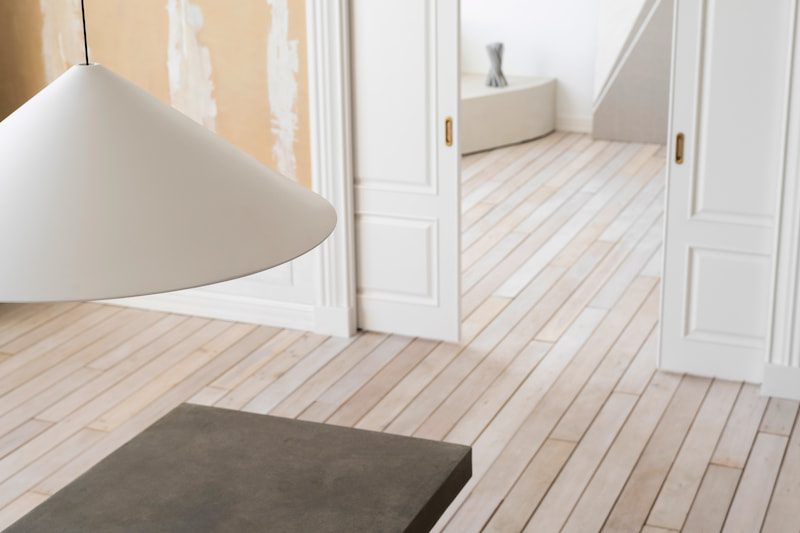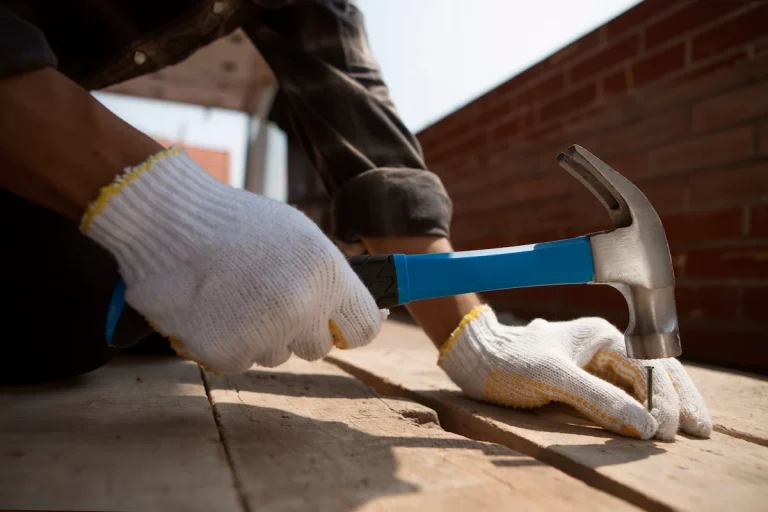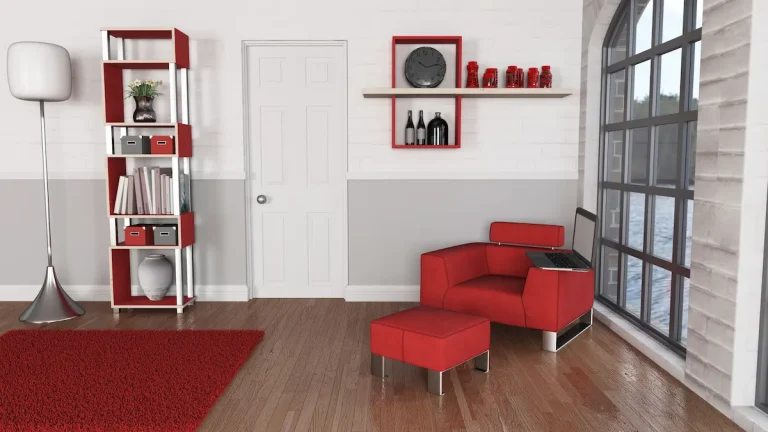Selecting the appropriate flooring for one’s home can be a challenging endeavour, particularly when evaluating common options such as carpet, hardwood, and Luxury Vinyl Tile. Each flooring type presents a distinct set of advantages and disadvantages that affect various factors, including aesthetics, durability, maintenance, comfort, cost, and resale value. How about carpet vs. hardwood?
This article delineates the key differences between carpet and hardwood across multiple dimensions, including their implications for allergies, noise reduction, and indoor air quality. By the conclusion of this article, readers will be well-equipped to make an informed decision that aligns with their lifestyle and preferences.
The Differences Between Carpet and Hardwood
When evaluating flooring options, it is essential to consider the distinctions between carpet and hardwood, as both materials present unique advantages and disadvantages that cater to a range of aesthetic preferences and functional requirements in home design.
Carpet flooring is frequently valued for its comfort and warmth, offering a soft surface that is particularly suitable for bedrooms and living areas. In contrast, hardwood flooring provides a classic and timeless appearance, noted for its durability and longevity.
A comprehensive understanding of these differences is critical for homeowners seeking to make informed decisions regarding their flooring investments, especially in terms of installation, maintenance, and overall suitability for specific environments.
1. Material and Appearance
The material and appearance of flooring play a crucial role in determining the overall aesthetic and ambience of a space. Carpet flooring often exhibits rich textures such as wool or seagrass, while hardwood flooring presents natural beauty through options such as maple, cherry, and oak.
The diverse range of materials available for flooring selection offers distinct advantages that cater to various personal preferences. Each type imparts its unique character to a room, impacting both the aesthetic quality and the comfort levels, as well as the overall indoor air quality.
- Carpet introduces a soothing, plush surface underfoot, making it ideal for bedrooms and family areas where comfort is a priority.
- Conversely, hardwood flooring exudes warmth and elegance, creating a timeless atmosphere that complements both traditional and contemporary designs.
In terms of colour, carpets can provide a spectrum from muted pastels to vibrant shades, facilitating the creation of either playful or serene environments. In contrast, the natural grains and tones of hardwood, including rich browns and light whites, enhance the organic appeal of any setting.
Ultimately, the decision regarding flooring is influenced by individual style preferences, which encompass not only aesthetic considerations but also the environmental impact and how textures interact with light and space to foster a harmonious living area.
2. Durability and Longevity
When evaluating durability and longevity, hardwood flooring generally surpasses carpet due to its robust construction, which enables it to endure heavy foot traffic and remain functional for decades with appropriate maintenance. In contrast, carpet may necessitate more frequent replacement, contingent upon the material quality and overall wear.
Hardwood flooring can typically last between 20 to 100 years, particularly when composed of high-quality materials and maintained through regular refinishing and cleaning. Conversely, the lifespan of carpet usually falls within the range of 5 to 15 years, significantly affected by factors such as foot traffic, fibre quality, and cleaning protocols employed.
- Maintenance Routines: Hardwood flooring requires periodic refinishing and occasional cleaning with suitable products, whereas carpet benefits from consistent vacuuming and professional deep cleaning.
- Cleaning Practices: The durability of both flooring options can greatly enhance with proper care. Hardwood demonstrates greater resistance to stains when cleaned promptly, while carpets can prevent premature wear through thorough and routine maintenance.
- Material Quality: Higher-grade hardwoods exhibit increased resilience; likewise, quality carpets typically provide better durability and extended lifespans.
Ultimately, although the initial costs associated with hardwood flooring may be higher, its longevity and reduced frequency of replacement can result in cost savings over time, positioning it as a more economical choice in the long term.
3. Maintenance and Cleaning
Maintaining carpet and hardwood flooring necessitates distinct cleaning methods; hardwood flooring requires regular sweeping and occasional polishing, whereas carpets demand consistent vacuuming and professional cleaning to prevent the buildup of allergens.
Each type of flooring possesses specific maintenance requirements that significantly impact indoor air quality. Carpeted surfaces tend to trap dust mites, pet dander, and other allergens within their fibres, making a consistent cleaning regimen essential. Regular vacuuming, preferably with a HEPA filter, can help to mitigate these airborne particles, while professional steam cleaning is critical for eliminating deep-seated contaminants.
In contrast, hardwood flooring does not retain allergens in the same manner but can still accumulate dust and dirt on its surface. A systematic approach, involving regular sweeping followed by damp mopping with an appropriate cleaner, is effective in maintaining its appearance.
- Hardwood Cleaning Routine: Sweep regularly to remove loose dirt.
- Carpet Maintenance: Vacuum frequently and schedule deep cleaning at least bi-annually.
Ultimately, understanding the unique characteristics of each flooring type facilitates the development of effective cleaning strategies, thereby ensuring a healthier living environment.
4. Cost and Affordability
When evaluating cost and affordability, it is essential to recognize that the initial investment in hardwood flooring can be considerably higher than that of carpet. However, hardwood flooring often offers superior long-term value due to its durability and potential for resale.
For many homeowners, assessing the true cost involves examining not only the upfront expenses but also the associated installation fees and ongoing maintenance costs. Generally, hardwood flooring entails a higher initial price for materials and skilled installation, while carpet may appear more economical at first glance. It is also critical to consider long-term expenses, such as cleaning, repairs, and the potential need for replacement over time.
- Installation Costs: Hardwood typically necessitates professional installation, which increases the initial expense, whereas certain types of carpet can be installed by the homeowner.
- Maintenance: Hardwood floors can be refinished easily, contributing to their longevity, while carpets may require frequent replacement, thereby elevating overall costs.
- Resale Value: Homes featuring hardwood floors generally command higher sale prices, yielding a better return on investment compared to those with carpet alone.
This comprehensive analysis of flooring costs ultimately enables homeowners to make informed decisions based on their specific requirements and financial considerations.
5. Comfort and Insulation
Carpet demonstrates superior comfort and insulation properties compared to hardwood flooring. It provides a soft surface underfoot, which contributes to maintaining warmth in rooms. In contrast, while hardwood is aesthetically pleasing, it can often feel cold and hard without the addition of rugs or underlays.
In evaluating overall comfort levels within a home, it is essential to acknowledge that carpet serves not only as a comfortable walking surface but also acts as a natural insulator. This characteristic aids in heat retention during colder months, potentially enhancing energy efficiency. Conversely, hardwood floors, though undeniably stylish and durable, generally lack this intrinsic warmth and may require supplementary elements, such as rugs or heated underlays, to foster a more inviting atmosphere.
- Carpet enhances comfort with its cushioned texture, providing a gentle feel for the feet.
- Hardwood flooring can feel chilly, particularly in winter, without additional coverings.
- Beyond insulation, carpet also contributes to noise reduction, creating a more tranquil environment.
Ultimately, the decision between these two flooring options depends on individual preferences and the desired comfort levels within the living space.
6. Environmental Impact and Sustainability
The environmental impact of selecting between carpet and hardwood flooring involves several critical factors, including sourcing practices, the use of renewable materials, and their effects on indoor air quality. Typically, carpets are manufactured from synthetic fibres, whereas hardwood flooring presents a more natural alternative when sourced sustainably.
Both flooring options offer distinct advantages and challenges; however, the sustainability of the materials used is particularly important. Hardwood flooring obtained from responsibly managed forests ensures that tree removal is balanced with replanting efforts, thereby promoting biodiversity and mitigating deforestation. In contrast, carpets often rely on petroleum-based synthetic materials, which can result in a higher carbon footprint throughout their production and disposal processes.
Additionally, it is essential to evaluate the impact of these flooring types on indoor air quality. Carpets tend to trap allergens within their fibres, which may adversely affect health over time, whereas hardwood flooring generally facilitates improved air circulation and is easier to maintain.
Carpet vs. Hardwood: Which Is Better for Allergies?
When evaluating the impact of flooring on allergies, many homeowners question which option is superior: carpet or hardwood. Each type presents distinct challenges and advantages relating to allergens and indoor air quality.
Carpet and Allergies
Carpet can serve as a reservoir for allergens, as dust mites, pet dander, and pollen tend to accumulate within its fibres. This accumulation underscores the necessity of regular cleaning and maintenance, particularly for individuals who suffer from allergies.
Plus these common irritants, mould spores and certain bacteria can infiltrate carpets, thriving in the damp and warm conditions that often arise without adequate ventilation. Consequently, it is imperative for homeowners and renters to consider the impact of their flooring choices on overall indoor air quality.
Regular vacuuming, preferably with a HEPA filter, can significantly diminish the presence of these allergens. Employing deep cleaning methods, such as hot water extraction or steam cleaning, can effectively eliminate embedded dust and other particles, providing essential relief for those afflicted by chronic allergies.
The health implications for individuals with allergies can be considerable, affecting daily activities and overall well-being. Those with sensitivities may experience symptoms ranging from mild discomfort to severe respiratory issues, highlighting the critical importance of maintaining a clean living environment.
- Consider alternatives to traditional carpeting, such as hardwood, tile, or laminate flooring, which do not trap allergens in the same manner.
- Selecting rugs made from synthetic materials that are easier to clean can also help mitigate the risk of allergen accumulation.
Hardwood and Allergies
Hardwood flooring generally presents fewer allergy-related issues compared to carpeting, as its hard surfaces do not trap dust and allergens. This characteristic facilitates easier cleaning methods, which can significantly enhance indoor air quality.
This makes hardwood flooring an excellent choice for individuals who suffer from allergies or respiratory conditions. In contrast to carpets, which can harbour dander, pollen, and other irritants, hardwood flooring provides a smooth surface that is considerably easier to maintain.
Regular sweeping or vacuuming can effectively eliminate dirt and debris with minimal effort, thereby substantially reducing allergen accumulation.
- Mopping can be carried out easily to ensure thorough cleanliness.
- Additionally, hardwood is less likely to retain moisture, which is a critical factor in minimising mould growth.
By selecting this type of flooring, homeowners can foster a healthier living environment and improve overall air quality, making it a prudent investment for personal well-being.
Better to Choose for Allergy Sufferers
When selecting the most suitable flooring for individuals with allergies, many experts advocate for hardwood flooring over carpet due to its reduced ability to trap allergens and its ease of maintenance, thereby fostering a healthier living environment.
This recommendation primarily stems from the fact that hardwood floors do not absorb dust, pet dander, or mould, all of which can exacerbate allergy symptoms. Furthermore, the straightforward cleaning process associated with hardwood surfaces allows for the regular removal of allergens, thereby enhancing indoor air quality.
For those considering flooring options, it is crucial to evaluate several factors, including:
- Maintenance requirements
- Personal health conditions
- Potential exposure to irritants
Ultimately, although hardwood is frequently favoured, individual circumstances may lead to alternative choices, such as laminate or tile, which also exhibit low allergen retention, depending on the specific needs and conditions of the user.
Carpet vs. Hardwood: Which Is Better for Noise Reduction?
In the discussion regarding the effectiveness of various flooring options for noise reduction, carpet is frequently regarded as superior to hardwood. This is attributed to its sound-absorbing properties, which help to diminish noise levels within a space, thereby contributing to a more comfortable living environment overall.
Carpet and Noise Reduction
Carpet functions as an effective solution for noise reduction, significantly muffling sound while providing a soft, cushioned surface that enhances both comfort and insulation within a room.
The unique properties of carpet play a crucial role in its sound-dampening capabilities, particularly its density and material composition. A thicker, high-density carpet is more efficient at absorbing sound, thereby reducing impact noise and echo.
For example, environments such as recording studios, home cinemas, and offices frequently benefit from the installation of carpet, as it minimises sound reflections and contributes to a quieter atmosphere. Research indicates that the use of carpet can lead to a reduction in noise levels by up to 30%.
Additionally, the materials used—such as wool or nylon—further enhance these noise-absorbing properties by trapping sound vibrations. Whether in residential or commercial settings, selecting carpet as a flooring option can significantly improve acoustics, making it not only an aesthetically pleasing choice but also a practical solution for mitigating noise pollution.
Hardwood and Noise Reduction
While hardwood flooring enhances the aesthetic appeal of a space, it often lacks adequate noise reduction capabilities compared to carpet. The solid surfaces of hardwood can reflect sound rather than absorb it, resulting in echoes and increased noise levels that may disrupt the tranquility of living environments.
This characteristic can pose a challenge for homeowners desiring a serene atmosphere. The reflective nature of hardwood can cause conversations, footsteps, and other sounds to reverberate, creating an ambiance that may feel less inviting than intended.
To effectively address these concerns, individuals may consider implementing several practical solutions:
- Area rugs: Incorporating rugs not only improves the visual appeal of the space but also aids in sound absorption, thereby reducing the overall noise level.
- Underlay: Placing underlay beneath the rugs can enhance comfort underfoot while further dampening sound.
- Acoustic panels: Installing these on walls can absorb sound energy and contribute to a quieter environment.
By integrating these elements, the negative effects of sound reflection in hardwood settings can be significantly mitigated, resulting in a more comfortable and welcoming home environment.
Better to Choose for Noise Reduction
When considering noise reduction in flooring options, carpet is often regarded as the preferred choice for individuals prioritising a quiet and comfortable environment, whereas hardwood flooring may necessitate additional treatments to achieve comparable results.
Carpeting inherently absorbs sound, creating a tranquil atmosphere suitable for both residential and commercial spaces. In contrast, hardwood flooring tends to reflect sound, which may not be ideal for those residing in shared living environments or requiring a quieter setting for work or relaxation.
For example, families with young children may find that carpets effectively minimise loud footsteps and playful noises, providing a comfortable and safe environment for play. Conversely, homeowners in modern lofts or contemporary flats may appreciate the aesthetic appeal of hardwood flooring but should also consider incorporating area rugs or sound-absorbing underlay to reduce noise levels.
The decision-making process when selecting between these flooring options should take into account not only the desired aesthetic but also lifestyle needs, including considerations such as room usage, existing décor, and individual preferences.
Carpet vs. Hardwood: Which Is Better for Resale Value?
In the realm of home renovation, the choice between carpet and hardwood flooring can have a significant impact on resale value. Numerous estate agents assert that hardwood flooring typically achieves a higher market price than carpet, owing to its durability and timeless aesthetic appeal.
Carpet and Resale Value
While carpet may provide comfort and aesthetic appeal, it typically does not offer the same level of resale value as hardwood, particularly in markets where buyers prioritise durable and low-maintenance flooring options. Therefore, it is essential for homeowners to carefully consider their flooring choices in relation to future market expectations.
As the real estate landscape continues to evolve, many potential buyers are increasingly inclined towards homes that feature flooring options characterised by longevity and ease of maintenance. Recent market trends indicate that properties with hardwood or tile flooring often attract higher offers compared to those with carpet.
- Homebuyers generally seek materials that reflect their lifestyles; for instance, families tend to prefer hardwood due to its resilience against wear and tear.
- The demand for sustainable and eco-friendly materials, such as bamboo and Luxury Vinyl Tile, has grown, as buyers increasingly look for options that align with their values.
- Specific styles, such as modern and minimalist decor, further influence buyer preferences, leading homeowners to evaluate whether carpet aligns with contemporary trends.
This shift underscores how the type of flooring can significantly impact a property’s appeal and marketability, reinforcing the notion that investing in quality materials may yield better returns in the long run.
Hardwood and Resale Value
Hardwood flooring is widely regarded as a prudent investment for homeowners, as it not only enhances the aesthetic appeal of a residence but also tends to increase the overall resale value of the property. This increase is attributed to the desirability of hardwood among buyers, who often prefer it over alternative flooring options such as carpet. The preference for hardwood stems from various factors that contribute to higher selling prices and improved marketability during the buying and selling process.
One of the primary advantages of hardwood flooring is its longevity; with proper maintenance, it can last for decades, providing potential buyers with peace of mind. In contrast to carpet, which may require replacement every few years due to wear and tear, hardwood’s durability ensures sustained value over time.
The maintenance requirements for hardwood flooring are notably low. A straightforward routine of cleaning and occasional refinishing can maintain its pristine appearance, whereas carpets may accumulate stains, odours, and allergens over time, necessitating more frequent upkeep.
The market appeal of hardwood flooring is considerable. Homes equipped with hardwood floors are frequently perceived as more upscale and desirable. Buyers are often willing to pay a premium for properties featuring this elegant flooring option, which in turn results in a higher resale value.
Investing in hardwood flooring not only enhances the interior aesthetic of a home but also significantly contributes to its market appeal and overall resale potential.
Which One to Choose for Resale Value?
For homeowners seeking to maximise resale value, hardwood flooring is generally the superior option, as it attracts a wider range of potential buyers and demonstrates enduring appeal, making it a more prudent long-term investment compared to carpet.
When evaluating flooring options, it is essential to consider several factors that extend beyond mere aesthetics, including how each choice aligns with personal style.
- Durability: Hardwood floors are highly resilient and can endure substantial foot traffic, whereas carpets may exhibit signs of wear more rapidly.
- Market Trends: Hardwood flooring conveys a sense of elegance and quality, often positively influencing buyer perceptions.
- Maintenance Cost: While carpet may appear less expensive initially, the cumulative costs of long-term maintenance can be considerable, which is crucial for any homeowner aiming to enhance their property’s appeal.
- Sustainability: Environmentally conscious buyers may prioritise homes featuring natural materials such as hardwood over synthetic alternatives.
Considering these considerations, it is evident that selecting the appropriate flooring plays a critical role in the overall investment decision for homeowners. Ultimately, both options have their strengths, and the decision depends on your unique needs. If you’re still undecided, the experts at TEKA Flooring are here to help.
Contact TEKA Flooring today to book an appointment to explore your options and find the flooring that’s just right for you!
Read also:

































